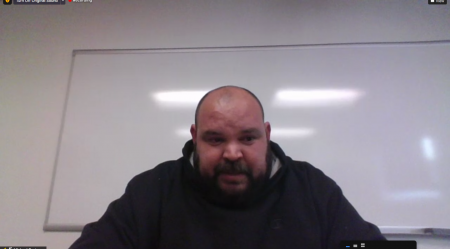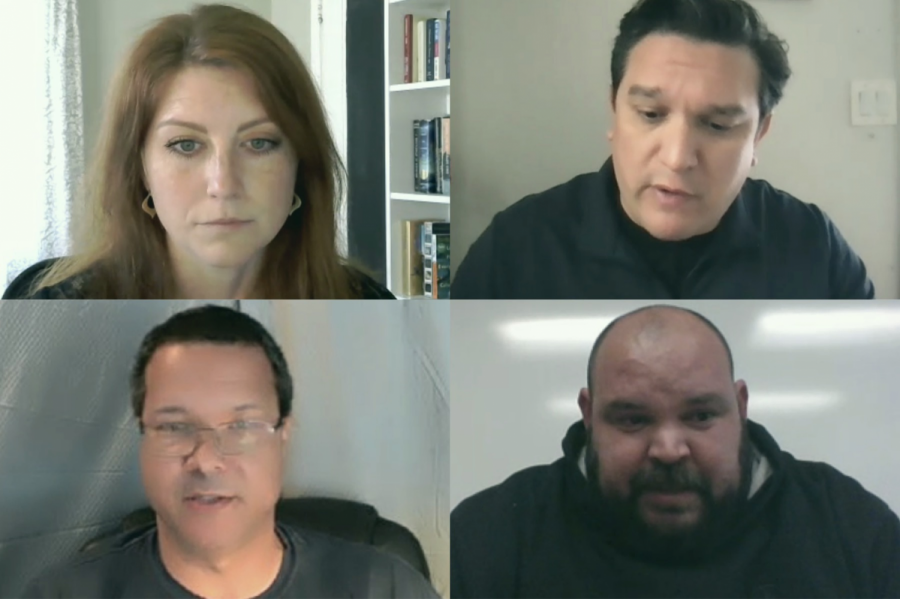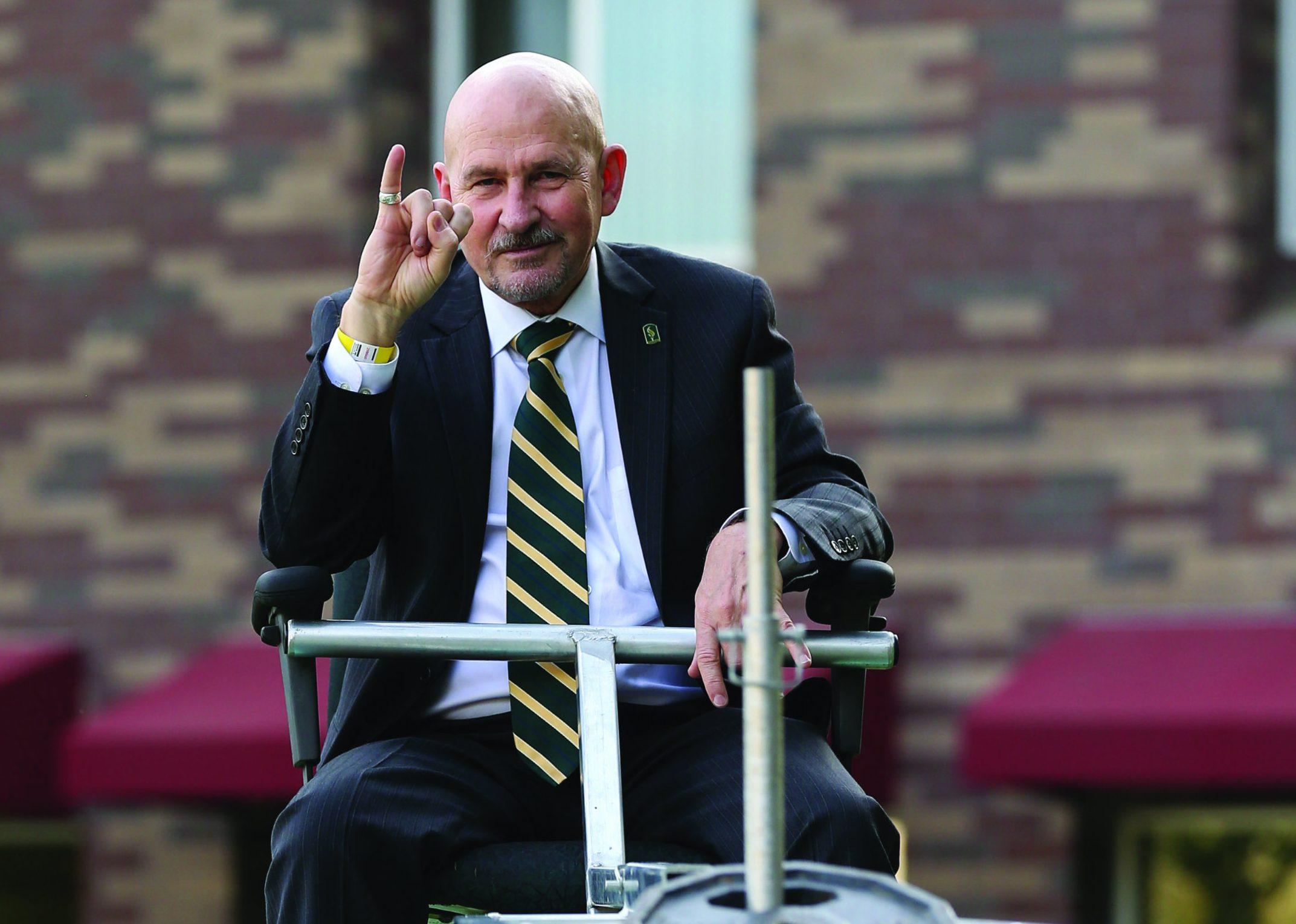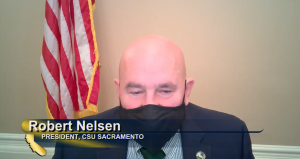Sac State employees allege labor exploitation, seek COVID-19 relief
‘It’s wrong to have to choose between a paycheck or your family’
(Left to right) Caitlin Fox, Fabrizio Sasso, Matt Mason, and Michael Castanon speak at a press conference hosted by a joint labor union council on Tuesday, March 2, 2021. At the press conference, Sac State employees shared stories of labor exploitation and discussed negotiations to extend COVID-19 relief programs. Graphic created in Canva.
March 2, 2021
Este articulo esta disponible en español.
Qiana Thomas, a Sacramento State custodial worker for the past eight years, expressed her fear at a joint labor council press conference on Tuesday of being written up at work for taking too many days off to take care of her kids.
“I provide essential services to keep students safe at a risk to myself,” Thomas said. “I’ve taken pay cuts because I have to take care of my kids. I’m afraid of getting written up for having so many days where I can’t work since January of this year.”
Thomas, a representative for the California State University Employees Union, said she works with chemicals all day. She said her job includes vacuuming, disinfecting, wiping down and sanitizing dorm areas for students who live on campus.
When in-person teaching for children closed at schools due to the pandemic, Thomas said she had to continue working full time while taking care of two young children.
Thomas said she has suffered approximately a “30 to 40% loss in earnings due to payroll” and that she is “terrified.”
The joint labor council included the Union of American Physicians and Dentists, California State University Employee Union, Academic Professionals of California, Teamsters Local 2010 union and the California Faculty Association. The unions addressed the university’s lack of COVID-19 relief for campus employees and allowed Sac State employees to share stories of labor exploitation.
RELATED: 2 campus dining food service employees test positive for COVID-19
“The university doesn’t function without their support staff and they aren’t providing the support staff with the support they need to make that happen,” president of the CSUEU, Caitlin Fox said.
When the pandemic hit, the CSU created a COVID-19 paid administrative leave program (CPAL) for employees to be able to take advantage of paid time in order to adjust to the pandemic’s effect on their personal lives and families.
All COVID-19 related relief programs offered by the university ended in Dec. 2020, and according to Fox, many unions have “yet to receive a favorable response from the CSU.”
“For those like me who did use the paid leave, we clinically exhausted our allowance,” Thomas said. “As long as my kids are still doing distance learning, CSUS’s working parents need an extended paid leave program. You cannot survive this pandemic without additional institutional support from the CSU.”
Teamsters Local 2010 union, which represents trade workers who work at CSU and UC colleges, has been the only union that has received extended COVID-19 related leave for their employees, after five drafts of negotiation that proceeded throughout the month of January.
“On January 28, we did come to an agreement of 256 hours [of paid leave] with our unit six employees giving up the emergency pay grievance,” said Matt Mason, a lead union representative for Teamsters Local 2010. “Still, we haven’t received a tactical letter or instructions on how to use these for our members.”
RELATED: Sac State female employees address systemic issues they face
Mason also said that because Teamsters Local 2010’s members are paid on a monthly basis, they attempted to complete negotiation and memorandum in place prior to the January payroll. Mason said the tactical letter from human resources did not arrive until Feb. 17.
“Campus managers and HR met on the campus here on the 23rd, and I had a discussion with HR myself on the 24th on the realities of the situation and trying to implement this, and still we haven’t received an instruction sheet, or our employees have not had their hours restored,” Mason said.
Mason said many of their employees are using vacation time to be able to deal with COVID-19 related issues.
“It’s not just childcare, it’s taking care of your family members who are sick, taking care of yourself if you think you’re going to be sent home for any kind of COVID related reasons,” Mason said. “There’s many, many COVID problems that are arising through here.”

Michael Castanon said he’s worked as a groundskeeper for the athletics field at Sac State for the past six years and continued to do so during the pandemic.
“There are 21 sports active with more than 550 students on campus and my shift is on Monday through Friday,” Castanon said.
He said he had to take approximately four months off last year when the pandemic started to stay at home with his three children while his wife continued working as an essential worker.
“It’s wrong to have to choose between a paycheck or your family,” Castanon said. “Custodians and ground workers are among the lowest paid at the university and most of us happen to also be people of color.”
Castanon said that the CSU deciding not to provide any additional paid time off in 2021 left him and many others in a tight spot.
“As the operational backbone of this university, it’s our work that helps keep everything else running at the CSU to serve students,” Castanon said. “Workers such as myself are the ones in the greater need of paid time off because our jobs can’t work from home.”
Fabrizio Sasso, the executive director of the Sacramento Central Labor Council, said the pandemic is felt nationally, but it especially had a heavier impact on single parents, specifically women.
“Sac State, along with the CSU system, has a responsibility to ensure gender equality in the CSU by providing paid leave programs so that working families can manage all the demands placed on them right now,” Sasso said.
Sasso said that all the unions are standing united in order to ensure that Sac State is supporting all of its workers during this unprecedented time.
“We shouldn’t have to tell Sac State that they are like Amazon and Walmart and they’re not doing what’s in the best interest of their employees,” Sasso said. “If Sac State truly wants to be a world class institution, they have to take care of their employees and lead by example.”
Toni Molle, the director of strategic communications and public affairs at the CSU’s chancellor’s office, said in an email that CSU campuses will determine funding sources for such programs, and that they may differ campus-to-campus.
“We understand the challenges faced by our valued faculty and staff during the pandemic, as they manage family responsibilities while also continuing to fulfill their duties to support the university’s mission and student learning,” Molle said.
Molle said extending the CSU’s COVID-19 paid administrative leave benefits program or granting additional leave requires negotiation with the multiple unions that represent CSU employees.
RELATED: Environmental studies professor reflects on experience with civil rights movement
Evelyn Nazario, the vice chancellor of human resources at the CSU, said her department engaged with the California Faculty Association (CFA) about additional COVID-19 related leave, but couldn’t honor the CFA’s submitted proposal due to the negative impact it would have on students.
“The proposal would entail removing established faculty from the classroom several weeks after instruction has already started, thus disrupting the learning environment,” Nazario said via email. “In keeping with the Chancellor’s commitment to supporting our faculty and staff during these difficult times, the University made a very generous offer to CFA of additional leave for COVID-19 related issues. This proposal was very similar to the programs the University had in effect for Spring and Fall 2020, yet CFA has rejected this proposal. To date, CFA has not made any further proposals to the University.”







































































































































